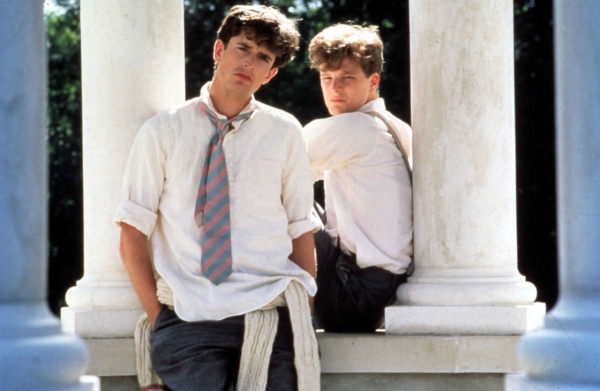Michael Coveney: Globe goes to war with RSC as Rupert Everett celebrates an anniversary

Having stolen the RSC's thunder as the prime source of Shakespeare for London audiences, the Globe on the South Bank is understandably miffed that the government has given the RSC a whopping grant to extend their operation in China, especially when the internationally-minded Globe has already established a foothold in the expanding Far Eastern market.
"We are great believers in the idea of subsidising the arts with public money," Dominic Dromgoole, the Globe's artistic director – the Globe is not publicly funded – told the Sunday Times; "We are equal believers, though, that such money should be distributed in an open and accountable manner." What's most interesting here is the Globe's suggestion that the RSC no longer has exclusive bragging rights on the Bard overseas; Shakespeare's Globe now has a huge international reach and reputation, and gives an impression of zest and expansionism in contrast to the starchier, sitting-on-laurels feel about the RSC, especially as most of the work produced in the Stratford-upon-Avon backwater headquarters never comes to London these days.
The RSC, though, obviously feel that the deal is all above board, and fully justified, though the British taxpayer might be concerned at £1.5 million government grant being used by the RSC to translate all 37 Shakespeare plays into Mandarin. Why? Surely, when the company visits China in 2016 (with another £300,000 doled out to stage the tour), they will perform the Bard in English? And any translation or indigenous workshop facilities surrounding that visit should be funded by the Chinese, not by us. The whole thing smacks of a cultural boost to the trade and industry policies and relations with the super-power, and a blatantly political government initiative.
Rupert revisits Another Country at the ICA
Rupert Everett has appeared at neither the RSC nor the Globe, even though his last three stage performances – as Henry Higgins in Pygmalion, Oscar Wilde in The Judas Kiss and Salieri in Amadeus this summer at Chichester – have established him as one of the most distinctively charismatic leading actors of our day.
Rupert's reputation as a bad boy – model, rock star, intimate of Madonna, boyfriend of Beatrice Dalle (who said he was her best ever lover), prankster and outrageously good fiction and memoir writer – is in danger of being eclipsed by middle-aged sobriety. At his request last Friday I hosted the anniversary screening of Another Country, his breakthrough movie, at the ICA. The place was packed, perhaps because Everett had been on BBC TV's Newsnight partly to flag up the event but mainly to defend Janet Suzman against the ridiculous charges of racism after she bemoaned (wrongly, as it happens) the lack of black faces in the London theatre.
Although the movie dates from 1984, Julian Mitchell's fine play – successfully revived at Chichester and the Trafalgar Studios this year – opened at Greenwich in 1981 before moving into the West End. In that stage cast, Everett was comparatively unknown, but not as unknown as a certain young Kenneth Branagh. Branagh's role of the Marxian Judd was taken over on stage, and in the film, by another unknown, Colin Firth.
After the screening of the film – which is skewed slightly from the play to emphasise the making of a spy, with Everett topping and tailing it in old man's make-up – I was joined on the ICA platform by the star, and the author, and read out a message we'd received earlier in the day from Colin Firth: "I deeply regret not being able to join you and your fellow survivors tonight. A little relieved, too, not to be in the shadow of my young, unblemished self and the ivoried Ganymede that was once Rupert Everett. Another Country was not the easiest of experiences. Rupert's behaviour was, for the most part, disgraceful – and turned out to be the basis of one of my most enduring friendships. His performance [as the insolent, seductive rebel public schoolboy Guy Bennett] is stunning. The film is good. Probably one of the best things I've been in… it seems to have dated very little, unlike Rupert's memories of the experience which have evolved spectacularly over the years."
Everett and Mitchell then shared some wonderful stories and spoke freely of their own homosexual experiences at public school, Everett at Ampleforth, Mitchell at Winchester. Questions from the floor included one from Max Stafford-Clark, whom Mitchell promptly fingered as having turned down the play originally when he, Stafford-Clark, was running the Royal Court. Stafford-Clark hotly denied this and the dispute was left hanging on Mitchell's assertion that he had the evidence of the rejection letter in his diary.
Of course, many good plays – it's usually a sign of a very good play – are turned down by one or two theatres before finding a production. Stafford-Clark was artistic director of the Court from 1979, and it's hard to see anyway how a play like Another Country would have fitted into his then policy of doing Caryl Churchill (Top Girls and Serious Money), Hanif Kureishi and Andrea Dunbar. And I don't think Everett's ever appeared at the Royal Court, either. He is hoping, though, to raise money to make his own film about Oscar Wilde in the near future, and Colin Firth is helping to push open a few doors and smooth a few tracks.










